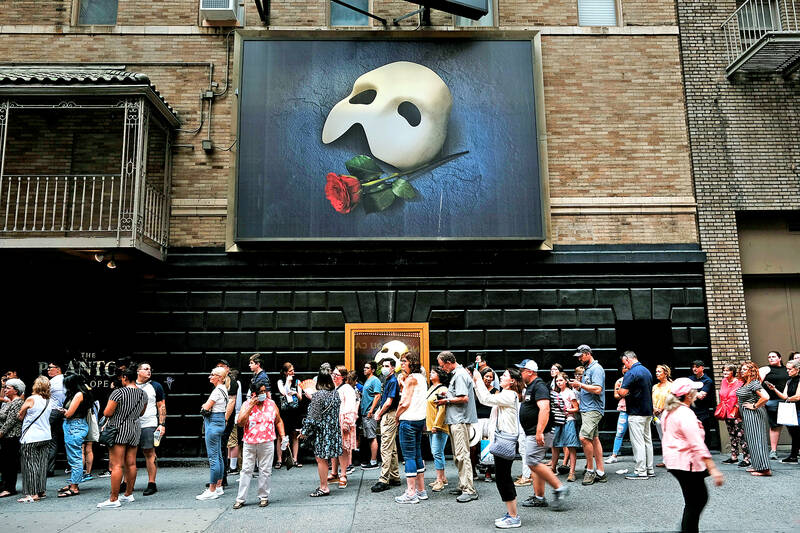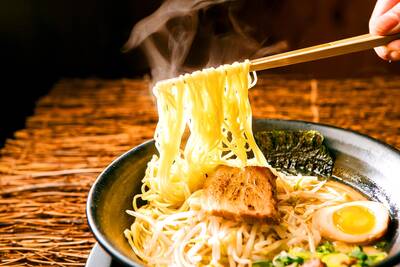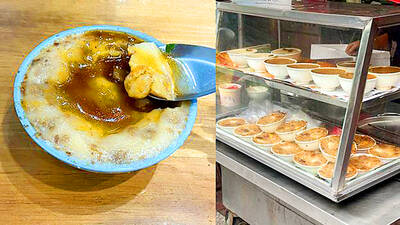A: How about the entertainment world? Is there anything to look forward to in 2023 there, too?
B: Yeah, events such as Rihanna’s Super Bowl halftime show, Eurovision 2023 and movies like “The Little Mermaid” live-action remake are all highly anticipated.
A: I’ve heard the long-running musical “The Phantom of the Opera” will finally bid farewell to Broadway this year.

Photo: AFP 照片:法新社
B: Well, the show first opened on Broadway in 1988. When it closes later in April, it will have played 13,981 performances.
A: 今年的娛樂圈,也有什麼令人期待的事物嗎?
B: 蕾哈娜的超級盃大秀、2023年歐洲歌唱大賽、《小美人魚》真人電影等強片……這些都將是今年的大事!
A: 聽說長壽歌舞劇《歌劇魅影》,終於要告別百老匯了。
B: 該劇1988年在百老匯開演,四月落幕時演出將達到一萬三千九百八十一場。
(By Eddy Chang, Taipei Times/台北時報張聖恩)

A: Artificial intelligence technology has been causing controversy lately: a student was caught cheating with AI to win the grand prize in an art contest. B: That’s so absurd. Does this mean that AI paints better than humans? A: Maybe. Luckily, the student was later disqualified. B: And more absurdly, it’s becoming more and more popular to use AI technology to “resurrect” people. A: Yeah, some netizens even posted videos featuring the late singer CoCo Lee, who was “resurrected” by them with AI software. A: 人工智慧的爭議不斷,有學生違規使用AI參加美術展,甚至贏得首獎。 B: 真誇張,這是不是代表AI比人類還強大? A: 或許吧,幸好得獎資格被取消。 B: 還有更誇張的︰讓死者重現的「AI復活」技術越來越熱門。 A: 對啊,還有網友製作已故歌后李玟「復活」的影片呢! (By Eddy Chang, Taipei Times/台北時報張聖恩)

It’s no secret that Japanese people have a deep affection for noodles. Like in the rest of East Asia, noodles are an important staple food, second only to rice. Japanese people have enjoyed noodles for over 1,000 years. The first noodles came from China and were introduced around 800 CE. As time passed, noodles in Japan not only became widespread but also developed some unique Japanese characteristics. The three most popular types of noodles in Japan are ramen, soba, and udon. Ramen, typically made from wheat flour, is usually thin and firm. The dough is kneaded and left to

Rice is an essential ingredient in Taiwanese cuisine. Many foods are made of rice, adding more variety to our cooking, such as rice cake, or “gui.” Wagui is made by steaming rice flour batter in a bowl. The term “gui” refers to a type of food made from rice, while “wa” refers to a bowl. The pronunciation of “gui” in Taiwanese Hokkien is similar to the word for “nobility” in Chinese, so it is common for people to prepare various types of gui, including wagui, as offerings to the gods or ancestors,. 米是台灣重要的主食,用米製成的食品十分多元,豐富我們的飲食,如米做成的「粿」。粿的意思是米做成的糕點,碗粿是將在來米漿倒入碗中蒸熟,因而得名。粿因為音同「貴」,因此碗粿等粿食常用作供品祭拜神明和祖先。 nobility (n.) 高貴,高尚;貴族 offering (n.) 供品 While Taiwan may not be

Continued from yesterday(延續自昨日) https://www.taipeitimes.com/News/lang As with many aspects of Japanese culture, there is etiquette to follow when you enjoy noodles. To fully experience noodles like a local on your next visit to Japan, consider these simple guidelines. First, be careful where you put your chopsticks. Don’t leave them sticking up in the broth or set them at the side of the bowl. When you have finished eating or if you’re taking a break, place them on the chopstick rest next to the bowl. Also, it is impolite to wave chopsticks around or bring them above mouth-level. Second, don’t take too